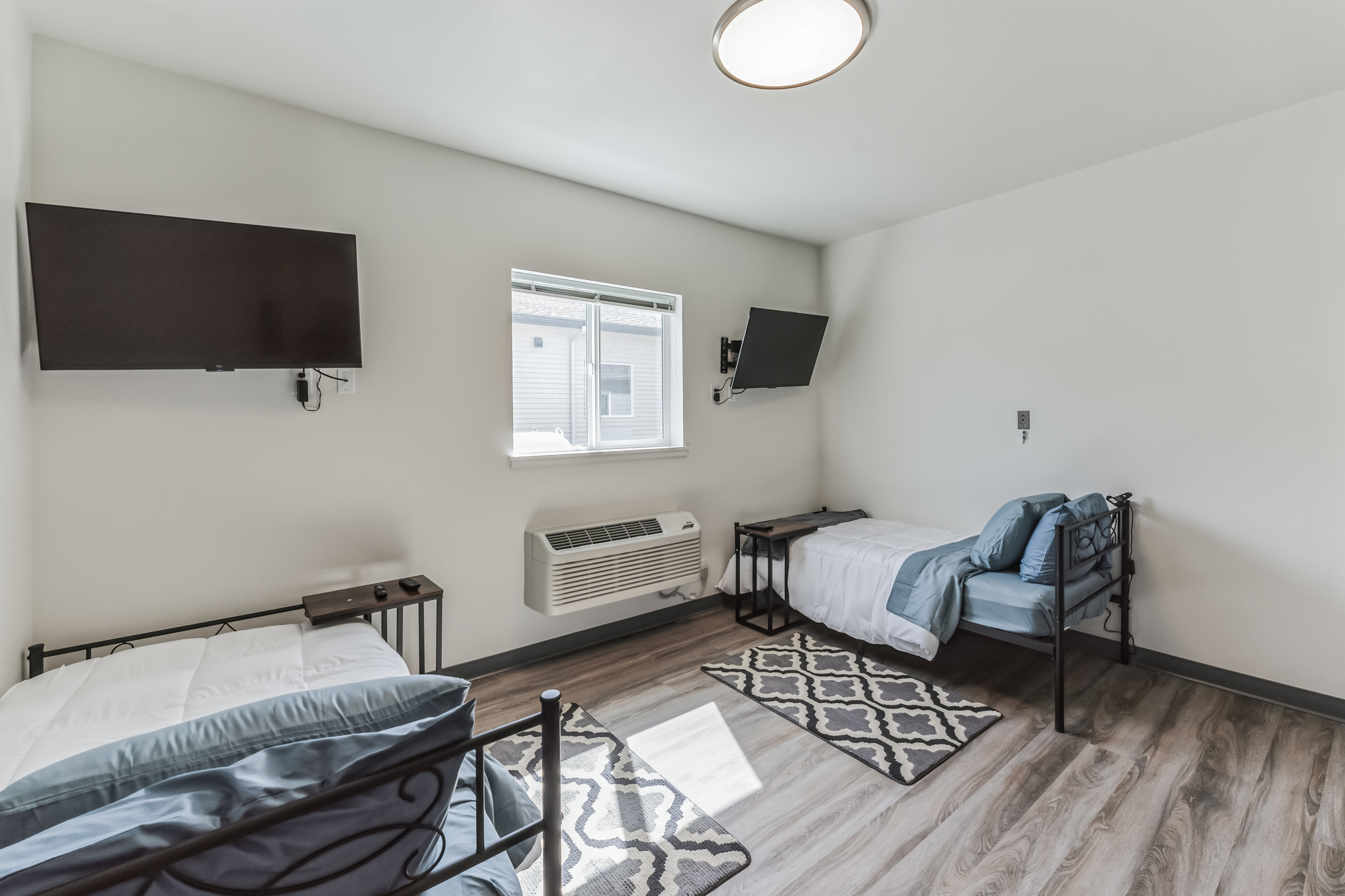
You walk into your bedroom, and it feels like the walls are closing in. Clothes pile up on the floor, dishes stack up in the corner, and clutter seems to multiply overnight. This isn’t just a messy room; it’s what many call a depression room, a space that reflects the sign of depression in your life.
If this sounds familiar, you’re not alone. I’m here to guide you through what a depression room means, why it happens, and how you can take steps to reclaim your space and your mental health. Whether you’re struggling yourself or supporting a loved one, let’s explore this together.
Skip To
Table of Contents
What Is a Depression Room?
A depression room is more than just a messy space. It’s a physical manifestation of the mental and emotional challenges of depression. When someone is battling depression, everyday tasks like tidying up, washing dirty dishes or doing laundry can feel overwhelming.
The result? A bedroom or living space that becomes chaotic, cluttered, and sometimes unlivable. This isn’t about being lazy; it’s about the paralyzing grip of mental health issues.
The Depression Room Meaning
The term depression room describes a space where clutter, mess, and disorganization mirror the internal turmoil of depression. People struggling with depression deal with a lot of depressive episodes.
Depression makes cleaning impossible, and the growing mess leads to feelings of shame and hopelessness. Depression affects at least 21 million adults in the U.S. every year, and for many, their living environment becomes a reflection of their mental state.
Why Does It Happen?
Depression rooms often stem from the symptoms of depression itself. Here’s why this happens:
- Lack of Motivation: Depression drains energy levels, making even small tasks feel impossible.
- Decision Fatigue: Choosing what to keep, toss, or clean can be paralyzing when your mind is foggy.
- Emotional Overwhelm: A messy room can feel like a visual reminder of failure, deepening the cycle of despair.
- Isolation: Many retreat to their rooms, and as depression worsens, so does the state of the space.
If your room or your loved one’s space feels like a messy room depression zone, it’s not a sign of weakness. It’s a signal that depression is taking a toll.
The Connection Between a Messy Room and Depression
A messy house depression scenario doesn’t just happen by accident. Research shows a strong link between physical environments and mental health. Cluttered spaces increase stress and reduce focus, which can worsen depressive symptoms. When your room is chaotic, it’s harder to find peace or rest, creating a vicious cycle.

End the Emotional Pain. Get Your Life Back.
Feeling Depressed, Anxious or Struggling with Mental Health Illness? Get Safe Comfortable Mental Health Dual Diagnosis High-Quality Therapy From Counselors That Care. Begin Your Recovery Now.
Hotline: (509) 348-4077

How a Depression Room Affects You
Living in a depression room can impact your life in ways you might not even realize:
- Increased Anxiety: Clutter bombards your brain with stimuli, making it harder to relax by disturbing sleep patterns.
- Shame and Guilt: You might feel embarrassed to invite people over or judged for the state of your space.
- Worsened Depression: A messy environment reinforces feelings of being stuck or out of control.
- Sleep Issues: A cluttered bedroom can disrupt sleep, which is critical for mental health recovery.
If you’re staring at a pile of laundry or a desk buried in papers, know that this isn’t just about tidying up, it’s about addressing the root cause: depression.
Steps to Tackle a Depression Room
Reclaiming your space is possible, even if it feels daunting. You don’t have to do it all at once.
Here’s how to start
1. Start Small and Celebrate Wins
You don’t need to clean the entire room in one go. Pick one small area a corner of your desk, a single drawer or even just making your bed. Start a 10-minute timer and concentrate on completing that single task.
Celebrate the win, no matter how small. Every step forward counts.
2. Break It Down into Manageable Tasks
A depression room can feel overwhelming, but breaking it into chunks helps. Try this:
- Day 1: Gather all trash and dispose of it.
- Day 2: Collect dirty clothes and start a load of laundry.
- Day 3: Clear one surface, like a nightstand or table.
- Day 4: Organize items into keep, donate or toss piles.
This approach makes the process less intimidating and builds momentum.
3. Ask for Support
You don’t have to do this alone. Ask a friend or family member to help. Sometimes, having someone sit with you while you sort through items can make it feel less isolating. If you are supporting a loved one, offer to help without judgment, maybe tackle a small task, and clean their room together.
4. Create a Maintenance Routine
Once your space is under control, please set up a simple routine to keep it that way. For example:
- Spend 5 minutes each evening tidying one area.
- Keep a basket for laundry to avoid piles.
- Schedule a weekly “reset” to maintain order.

Treatment Options for Depression
Professional support can make a world of difference. Here are some options:
- Therapy: Cognitive Behavioral Therapy (CBT) can help you manage negative thoughts and build coping skills. Learn more about CBT from the National Library of Medicine.
- Medication: Antidepressants can help balance brain chemistry. A psychiatrist can guide you on what’s right for you.
- Support Groups: Sharing with those who relate can reduce isolation.
- Inpatient or Outpatient Programs: For severe depression, structured programs offer intensive support from mental health professionals.
Get Help. Get Better. Get Your Life Back.
Searching for Accredited Dual Diagnosis Mental Health Centers Near You?
Even if therapy failed previously, or are in the middle of a difficult crisis, we stand ready to support you. Our trusted behavioral health specialists will not give up on you. When you feel ready or just want someone to speak to about counseling alternatives to change your life call us. Even if we cannot assist you, we will lead you to wherever you can get support. There is no obligation. Call our hotline today.
FREE 24/7 Dual Diagnosis Mental Health Services HotlineHow Loved Ones Can Help
If you’re worried about someone with a depression room, your support can make a huge impact. Here’s If you’re worried about someone with a depression room, your support can make a huge impact. Here’s how to help:
- Listen Without Judgment: Let them know you’re there, no matter the state of their room.
- Offer Practical Help: Suggest doing a small task together, like sorting laundry or clearing a table.
- Encourage Professional Support: Gently suggest therapy or a treatment program, emphasizing that it is a sign of strength to seek help.
- Be Patient: Recovery takes time, and so does reclaiming a space.
Call today to speak with our team and learn more about our programs. We Level Up Washington: (509) 348-4077. Your next step starts here.
Comfortable Facilities & Amenities
High-Quality Mental Health Services & Behaviroal Health Substance Abuse Treatment
Rehab Centers TourRenowned Mental Health Centers. Serene Private Facilities. Inpatient Rehab Programs Vary.
Mental Health Helpline: (509) 348-4077Proven recovery success experience, backed by a Team w/ History of:
15+
Years of Unified Experience
100s
5-Star Reviews Across Our Centers
10K
Recovery Success Stories Across Our Network
- Low Patient to Therapist Ratio
- Comprehensive Dual-Diagnosis Treatment
- Complimentary Family & Alumni Programs
- Coaching, Recovery & Development Events
- Comfortable Onsite Medical Detox Center
Frequently Asked Questions (FAQs)
-
What is a depression room?
A depression room is a living space that becomes cluttered and disorganized due to the effects of depression, reflecting the person’s mental and emotional state.
-
Why does depression lead to a messy room?
Depression drains energy, clouds decision-making, and fosters isolation, making it hard to maintain a tidy space. The resulting mess can deepen feelings of guilt and hopelessness.
-
Where in Spokane Valley, Washington, can I find help managing depression?
We Level Up Washington in Spokane Valley offers comprehensive mental health programs, including therapy and support for depression. Contact us to explore your options.
-
Where in Post Falls, Idaho, can I find treatment for depression?
While our facility is in Spokane Valley, we serve clients from nearby Post Falls. Reach out to discuss treatment or trusted local referrals.
-
How can I support someone with a depression room?
Offer non-judgmental support, help with small tasks, and encourage professional care. Your presence can make a big difference.
-
Does cleaning a depression room help mental health conditions?
Yes, tidying up can reduce stress and restore a sense of control, but addressing depression through therapy or treatment is key for long-term recovery.





